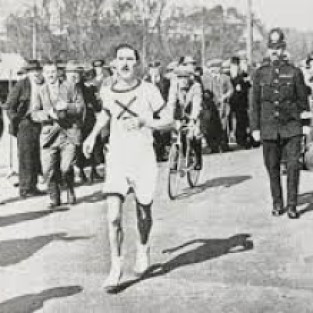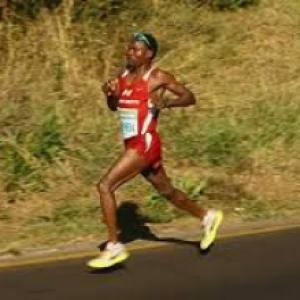In the build-up to Comrades 2019, and in my blog about three time winner, Dave Bagshaw, I happened to mention what I regarded as a Hat Trick, the fact that he had won three Comrades in three successive years and that only five men and three women in total in the history of the race have been able to do this.
Shortly after I published the blog that mentioned the “hat trick”, I received a Whatsapp message from Bruce Fordyce to tell me that he had enjoyed reading the article about Dave Bagshaw (whom he knows) and that he felt proud to be a member of “The Hat Trick Club” – and so the term was born!
In the run up to the race itself, I referred to “the Hat Trick Club” quite a few times on Twitter and especially speculation as to whether we would see a 6th male member of this exclusive “club” if Bongmusa Mthembu won his third Comrades in as many years. Sadly Bongmusa had to settle for second place after a brilliant and tactical run by Edward Mothibe saw Edward take the win.
So for the next few years anyway, “The Hat Trick Club” will still have just 5 men and 3 women members but who are they and what makes winning three Comrades in three successive years so special?
In a previous blog some time ago, I made reference to the fact that winning Comrades is something very special irrespective of the number of Comrades a runner may have won and that there is a very long list of runners who had finished high up in the final positions but who couldn’t actually win the race and amongst them some extremely good Comrades runners.
I thought then that it would be a good idea to look at the members of this exclusive “club” that Bruce Fordyce dubbed “The Hat Trick Club” and how proud he was to be a member of that club.
So who are the members of this “club”?
The first person to win three Comrades in three successive years was Arthur Newton but he went beyond a hat trick of wins with four wins in four years in 1922, 1923, 1924 and 1925.
There are some who might say that given the small fields in the early days of Comrades that this wasn’t a special feat but as I’ve said there is a long list of runners who were good but just not good enough to pull off the win. Bear in mind that even Newton was beaten when he finished 2nd in 1926 and beaten by a runner who had finished in second place a few times so the argument that one runner had to be dominant with those small fields doesn’t actually work.
 Arthur Newton in action
Arthur Newton in action
The runner who beat Arthur Newton in 1926 was Harry Phillips and not only did he beat Newton who finished second that year, but he also set a new “best time” (record) for the Up Run but he could only manage that one win in the years he ran Comrades.
In the first Comrades in 1921, Phillips finished second to Bill Rowan some 40 minutes behind Rowan.
Phillips was again 2nd in 1922 this time behind Arthur Newton. He was again 2nd to Newton in 1925 and he managed just that single win despite what were epic battles against Newton and it was those wins that set Newton apart in the 1920’s and gave him the 4 successive wins and the first “hat trick”.
We had to wait virtually 40 years before anyone achieved three wins in three successive years again and bear in mind some of the great Comrades runners like Hardy Ballington, his younger brother Johnny who had 5 gold medals and a best position of 2nd in 1949 but never won, Wally Hayward who ended up with 5 wins in total but no hat trick (to be fair he never ran three years in a row), Gerald Walsh with two wins and a heap of gold medals, Gordon Baker with 9 starts and 8 gold medals some of which were for 2nd place and Jackie Mekler who won 5 times but not three in three years.
All of these great runners were around in the years before we saw the second person to win three times in three successive years.
It was Dave Bagshaw in 1969, 1970 and 1971 when we saw our second Hat Trick of wins. Dave Bagshaw had his first win and as a novice also broke the record.
 Dave Bagshaw crossing the finish line in 1971
Dave Bagshaw crossing the finish line in 1971
In 1970 Bagshaw won again and again broke the record and then his third win came in 1971 when he was just short of his own record so a hat trick of wins for him despite some intense competition from people like Dave Box, Manie Kuhn and even Jackie Mekler. Dave Bagshaw was the favourite to win his fourth Comrades in 1972 but he had to be content with second place when he was beaten by Mick Orton.
Next to get a hat trick of wins was Alan Robb who won in 1976, 1977 and 1978. Robb was beaten in 1979 by Piet Vorster but won again in 1980 beating Bruce Fordyce in a huge battle for the win.
 Alan Robb crossing the finish line in the 1976 Down Run
Alan Robb crossing the finish line in the 1976 Down Run
The three wins had given him his hat trick and it was in 1978 on the Down Run that Robb became the first runner to run Comrades in under 5 hours and 30 minutes.
1981 and enter Bruce Fordyce. Bruce actually did a “Double Hat Trick” when he won 8 Comrades in successive years from 1981 to 1988.
 Bruce Fordyce crosses the finish line in one of his many wins
Bruce Fordyce crosses the finish line in one of his many wins
I have little doubt that he would have made it a “triple hat trick” had he run the race in 1989 but he didn’t run in 1989 after having run (and won) a 100km race against a number of foreign so-called 100km specialists earlier in 1989 in Stellenbosch. He then came back in 1990 to win his 9th Comrades.
We then had to wait another 20 years for the next, and at this stage, last member of the “Hat Trick Club”. In 2009, 2010 and 2011 it was Zimbabwean, Stephen Muzhingi who was first home in those three years.
 Stephen Muzhingi in full cry
Stephen Muzhingi in full cry
Muzhingi was a better than fair runner with a collection of gold medals for finishing in the top 10 both before and after his hat trick of wins. He won gold medals in 2007 and 2008 before his first win and in 2012, 2013, 2014 and 2015 after his third win so he in effect earned his green number in two ways. Three wins and five golds.
There are also three members of “The Hat Trick Club” in the women’s section of Comrades. The first of them after women were official entrants in 1975 was Lettie van Zyl.
She won in 1976, 1977 and 1978 but before that, Lettie van Zyl had initially been the first woman finisher in 1975. She clocked 8:50 but she wasn’t recognised as the women’s winner when it was discovered she hadn’t met the qualifying standards.
Those who were around then will remember that for novices in 1975 it was a requirement that they qualify by running a standard marathon in 3 hours 30 minutes.
 Lettie van Zyl three time winner in 1976, 1977 & 1978
Lettie van Zyl three time winner in 1976, 1977 & 1978
The honour of being the first official woman finisher in 1975 then went to Elizabeth Cavanagh in 10:08. Interesting that whilst Lettie was achieving her hat trick of wins, Alan Robb achieved his hat trick in the same three years.
Then it was almost 10 years before our next women’s hat trick member came along. New Zealander turned South African Helen Lucre won in 1985, 1986 and 1987.
The interesting thing about Helen is that she only started running towards the end of 1979 after she settled in Pretoria and started running just to keep fit but by the time she finished her running career, she had won every major race in the country. She was also instrumental in starting what has now grown into the Spar Ladies race and also spent many years in road running administration.
The last of the women’s hat trick winners – but with four wins in succession – was one of the famous Russian twins, Elena Nurgalieva who managed four wins in four years in 2010, 2011, 2012 & 2013
She had a total of 8 wins and although she didn’t emulate Bruce Fordyce with his 8 wins in 8 years and 9 wins in total, her Comrades runs were an incredible performance nonetheless.
So in both the men’s and women’s races, our chances of another member, either male or female – of “The Hat Trick Club” is going to have to wait until, at best, 2021 because for both the winners in 2019 it was a first win and either of them would need to win the next two Comrades.
I said at the start of this article that we must never and can never take away anything from any winner of Comrades, it’s a fantastic achievement in anybody’s language but three wins in three successive years is very special and not easy to achieve when you consider that only 8 runners have managed it since that first Comrades in 1921 and we have now had 94 Comrades Marathons.
I mentioned the fact at the start that some people might say that it was easier to achieve a hat trick of wins in days gone by with smaller fields but it should never be forgotten that even though the winning times may have been slower than those being recorded in recent years, the competition up front was as intense as it’s ever been and irrespective of when the three wins in three successive years were run, it was a massive achievement.
June 2019



 Helen in Comrades
Helen in Comrades